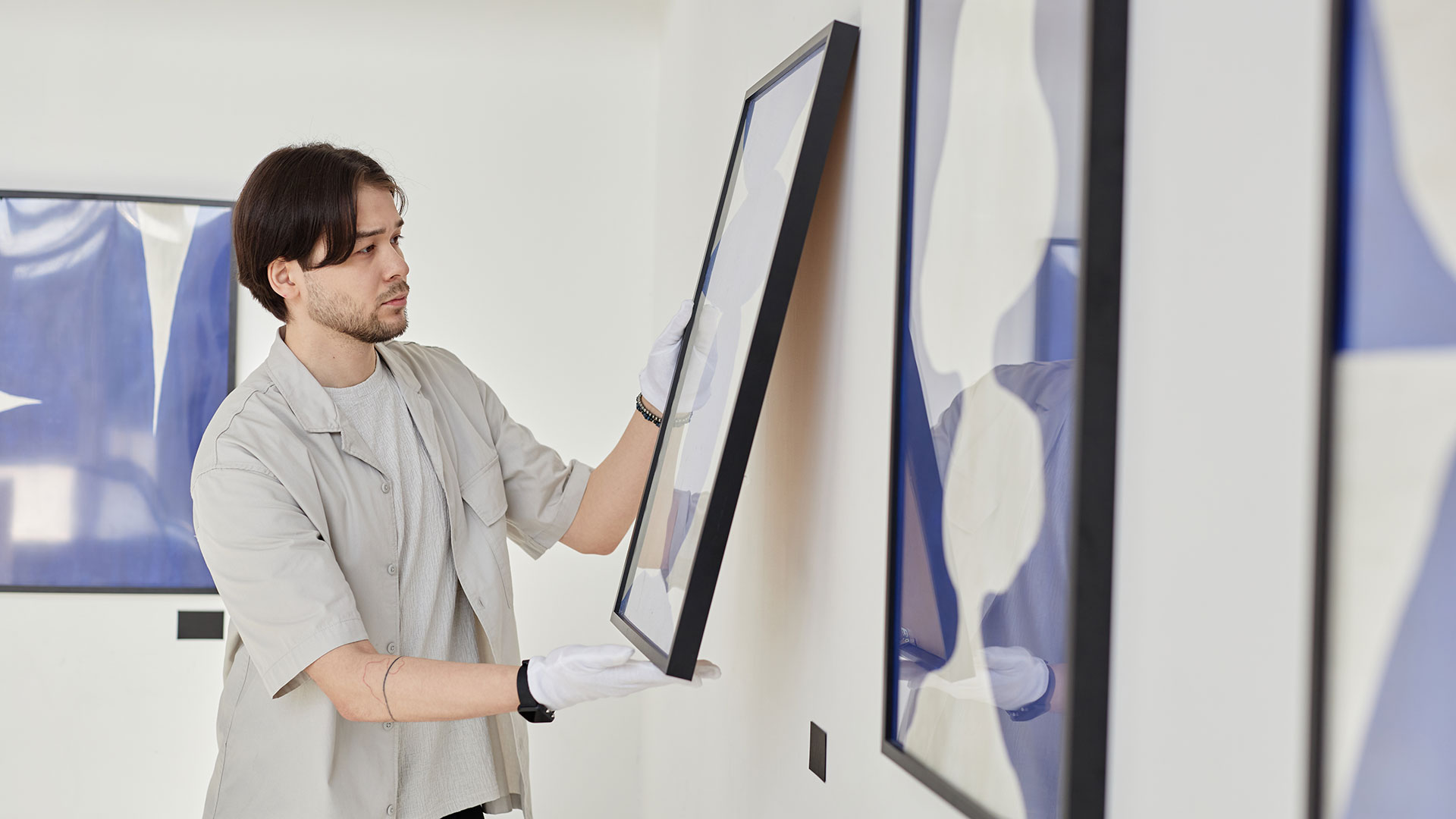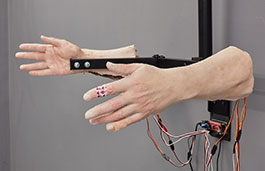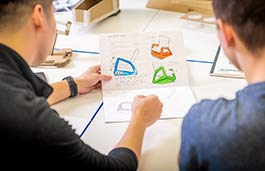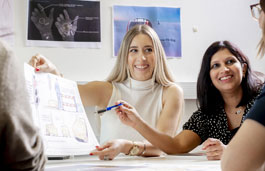Search
Curation MA
Study level: Postgraduate
With a focus on activism and social change, this course aims to give creative thinkers the tools and strategies to facilitate innovative art projects.
Year of entry
Location
Coventry University (Coventry)
Study mode
Full-time
Duration
1 year full-time
Course code
CAST001
Start date
November 2025
January 2026
March 2026
May 2026
July 2026
Course overview
Curation MA is for those wanting to innovate in curatorial practice, explore art’s role in social change and develop leadership skills. Prepare to engage with global challenges, amplify voices, and advance your career in contemporary culture.
Key course content includes:
- Exploring curatorial practices that go beyond traditional spaces, using tools and facilities to create impactful projects and measure social value.
- Collaborating on interdisciplinary projects with external organisations to build your leadership, adaptability and problem-solving skills.
5 QS Stars for Teaching and Facilities
QS Stars University RatingsRanked 9th Modern University in UK by the Times
The Times and Sunday Times Good University Guide 2025Ranked 4th for Overall Satisfaction in PTES
Postgraduate Taught Experience Survey (PTES) 2025Why you should study this course
- High profile partnerships with industry, with a new arts venue currently being built in Coventry.
- Next generation leadership in the arts positioning curatorial practice in wider regional contexts in the UK and overseas, engaging with programmes such as the British Art Show, biennials such as Europe’s Manifesta, and British Council’s Spark programme in Hong Kong.
- Modern facilities including metal, wood and ceramics workshops alongside digital suites and immersive studios with VR technologies and capabilities.4
- An international profile for excellence and innovation with associations to the pioneering work of the conceptual art group Art & Language in the 1960s, and the foundations of the influential Blk Art Group and the British Black art movement in the early 1980s.
- An international community forging interdisciplinary collaborations and professional networks to sustain careers in creative and cultural industries; the course also benefits from links to world-leading researchers across the wider Coventry University Group.
Collaborations

Endorsement by the Royal Society for Arts, Manufactures and Commerce (RSA)
Coventry University and the RSA have collaborated on a module concerning social and ethical responsibility. You will be entitled to a 12-month fellowship of the RSA so you can access all RSA resources and platforms during your period of study. Once you have successfully passed the Professional Practice and Innovation module, you will receive an RSA digital credential.
What you'll study
Explore curatorial practice as activism, inclusivity and influence, engaging with design theory, professional innovation, and representation. Collaborate on real-world projects, address societal issues through creative methodologies, and build a future-focused skill set.
We regularly review our course content, to make it relevant and current for the benefit of our students. For these reasons, course modules may be updated.
How you'll learn
Teaching and learning methods may include:
- lectures
- seminars
- tutorials
- presentations
- group projects
- workshops
- practical laboratory sessions.
Teaching and learning hours
As a full-time postgraduate student, you will study modules totalling 180 credits each academic year. A typical 30-credit module requires a total of 300 hours of study. Study hours are made up of teaching and learning hours, and guided and independent study.
Teaching hours
Teaching hours will vary, depending on where you are in your studies, but on average, you will have between 8 and 12 teaching and learning hours each week. You will also have the opportunity to attend optional sessions, including time with a Success Coach or to meet with staff for advice and feedback.
Guided and independent learning
Throughout your studies, you will be expected to spend time in guided and independent learning which will make up the required study hours per module. You will be undertaking a variety of activities, learning through guided background research, planning and preparation, studio activity, creative practice and making, reviewing what you have learned and completing assignments. This can be completed around your personal commitments. As you progress towards the end of your studies, you will spend more time on independent learning.
Online learning
As an innovative university, we use different teaching methods, including online tools and emerging technologies. So, some of your teaching hours and assessments may be delivered online.
Assessment
This course will be assessed using a variety of methods which could vary depending on the module. Assessment methods may include:
- reports
- tests
- essays
- practical coursework
- assignments
- Viva voce
- presentations.
The Coventry University assessment strategy aims to ensure that our courses are fairly assessed and allows us to monitor student progression towards achieving the intended learning outcomes.
Entry requirements
Typical entry requirements:
Fees and funding
| Student | Full-time | Part-time |
|---|---|---|
| UK, Ireland*, Channel Islands or Isle of Man | £9,350 | Not available |
| EU | £9,350 per year with EU Support Bursary** £18,600 per year without EU Support Bursary** |
Not available |
| International | £18,600 | Not available |
For advice and guidance on tuition fees3 and student loans visit our Postgraduate Finance page and see the university's Tuition Fee and Refund Terms and Conditions.
We offer a range of international scholarships to students all over the world. For more information, visit our International Scholarships page.
Tuition fees cover the cost of your teaching, assessments, facilities and support services. There may be additional costs not covered by this fee such as accommodation and living costs, recommended reading books, stationery, printing and re-assessments should you need them.
The following are additional costs not included in the tuition fees:
- Any optional overseas field trips or visits: £400+ per trip.
- Any costs associated with securing, attending or completing a placement (whether in the UK or abroad).
*Irish student fees
The rights of Irish residents to study in the UK are preserved under the Common Travel Area arrangement. If you are an Irish student and meet the residency criteria, you can study in England, pay the same level of tuition fees as English students and utilise the Tuition Fee Loan.
**EU Support Bursary
Following the UK's exit from the European Union, we are offering financial support to all eligible EU students who wish to study an undergraduate or a postgraduate degree with us full-time. This bursary will be used to offset the cost of your tuition fees to bring them in line with that of UK students. Students studying a degree with a foundation year with us are not eligible for the bursary.
Facilities
The Delia Derbyshire Building hosts sector-leading facilities in a unique environment. You will have access to our full range of workshops, from metal work and ceramics to immersive studios with modern virtual reality and mixed-reality technologies.

Lanchester Library
The library is open 364 days a year. It’s where you can access your course’s specialist Academic Liaison Librarian. It’s also home to specialist teams which can support you with your academic writing and maths and statistics questions.

The Hub
The Hub is the centre of student life on campus. Facilities include a food court, convenience store, multi-faith centre, medical centre, hairdresser, coffee shops and the Your SU offices. It has fully licensed function spaces and a bar.

Careers and employability
Get one-on-one guidance lasting up to 18 months from the end of your course. We’ll help you find placements and graduate roles, offer CV and application checks, mentoring, skills workshops, employer events and more.
Facilities are subject to availability. Access to some facilities (including some teaching and learning spaces) may vary from those advertised and/or may have reduced availability or restrictions where the university is following public authority guidance, decisions or orders.
Careers and opportunities
On successful completion of the course, you will be able to:
- demonstrate a systematic understanding and application of the theoretical and thematic concerns of their chosen context transforming research into innovative curatorial responses for diverse audiences and contexts
- develop and launch original curatorial proposals that demonstrate a systematic understanding of the expanded roles of a curator
- independently identify, write, and pitch for funding for curatorial projects in the expanded fields of curation
- apply enhanced social change and activist methods and tools to curatorial projects
- critically assess public and the ethical impacts and legacies of curatorial work within varying social and geographical contexts
- build effective partnerships and networks to communicate with audiences in an appropriate manner
- critically evaluate and measure feasibility and success of curatorial projects through the application of an evaluative toolkit for a sustainable career in curatorial practice
- apply systematic knowledge and understanding of the role of creative teams in the realisation of curatorial projects.
Successful graduates may seek the following careers:
- freelance / self-employment
- curation for national and international cultural institutions
- curator for national and international commercial galleries
- curator of collections such as the National Trust
- collection managers
- curator of national and international festivals, biennials and fairs
- curation for hospitals
- curation for city centres and regional arts organisations and events
- curation for universities
- curation for social media and digital platforms
- curating in the gallery and museum section, both public and private sector
- archivists
- digital archivists
- records manager
- collections mangers
- director of international and national art galleries
- curatorial research
- theoreticians
- cultural policy makers
- leading innovation in the cultural sector.
Where our graduates work
We have several undergraduate alumni who have progressed into curatorial positions both locally and internationally such as the Co-CEO of Birmingham Museums Trust, the Managing Director of the Institute of Contemporary Art in London, and the curator at the Museum of Contemporary Art Antwerp. More recently, a Senior Visual Arts Officer at Rugby Art Gallery, and at Coventry Cathedral as Cultural Events Organiser.
Our new Curation MA course will allow us to retain talent in Coventry, as well as to offer an attractive progression route as Coventry aims to become one of the largest cultural hubs in the world.
How to apply
You may also like

Fine Art: Digital MA






